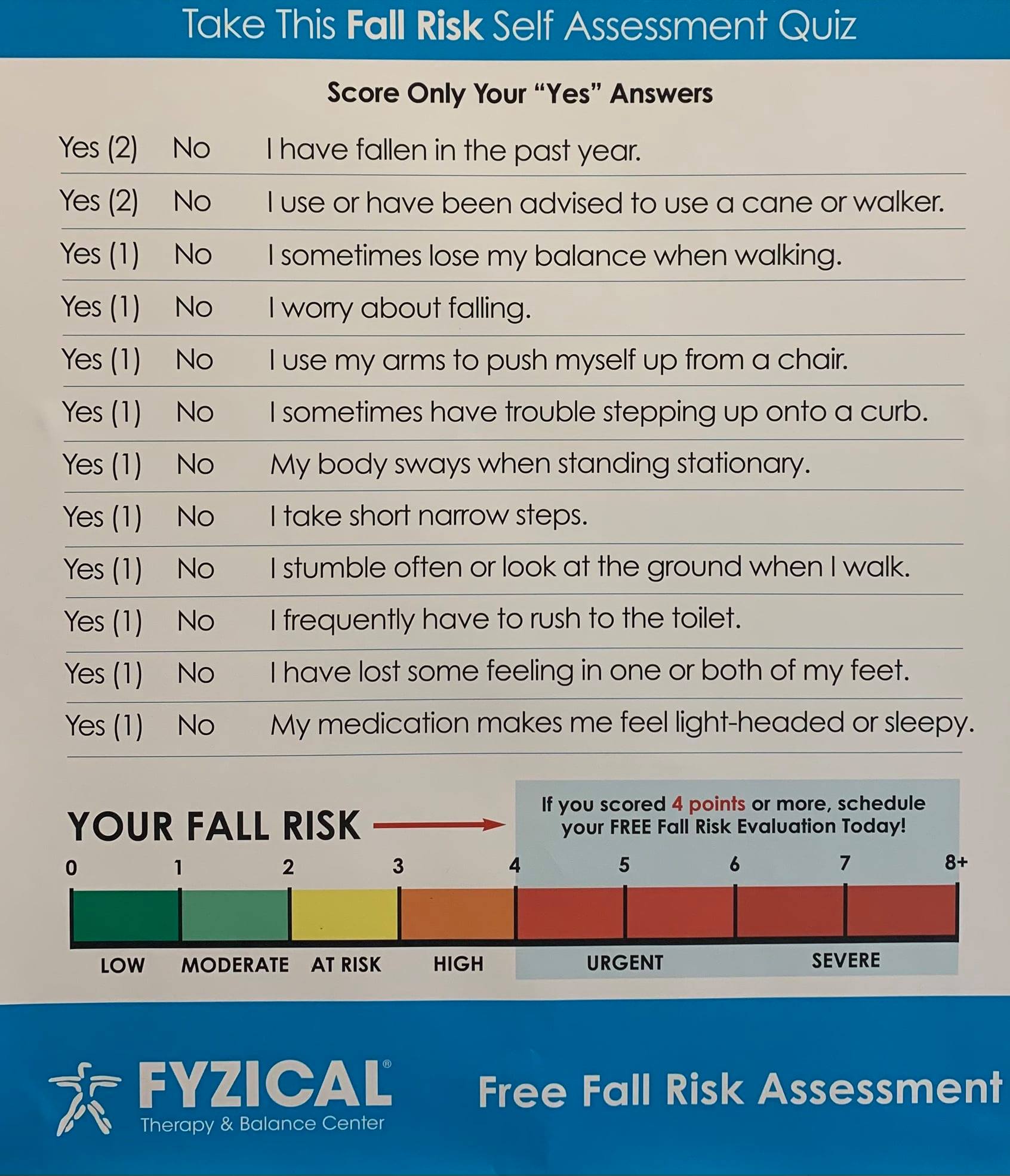A Biased View of Dementia Fall Risk
A Biased View of Dementia Fall Risk
Blog Article
Examine This Report on Dementia Fall Risk
Table of ContentsThe Only Guide for Dementia Fall RiskHow Dementia Fall Risk can Save You Time, Stress, and Money.The Of Dementia Fall RiskWhat Does Dementia Fall Risk Do?The 5-Second Trick For Dementia Fall Risk
The FRAT has three sections: fall danger status, risk aspect checklist, and action strategy. A Loss Danger Standing includes information concerning history of current drops, medicines, mental and cognitive status of the patient - Dementia Fall Risk.If the client scores on a risk aspect, the corresponding number of points are counted to the person's autumn risk rating in the box to the much. If a client's loss threat rating amounts to five or higher, the person goes to high threat for drops. If the individual scores only four factors or reduced, they are still at some threat of falling, and the registered nurse should use their best clinical assessment to manage all autumn danger aspects as component of a holistic treatment strategy.
These standard methods, in basic, help establish a secure setting that minimizes accidental drops and defines core preventative steps for all people. Signs are crucial for patients at danger for drops.
What Does Dementia Fall Risk Mean?
For instance, wristbands should include the person's last and first name, date of birth, and NHS number in the UK. Details must be printed/written in black against a white background. Just red shade must be made use of to signify unique individual status. These recommendations are constant with existing advancements in individual identification (Sevdalis et al., 2009).
Items that are too much may require the patient to reach out or ambulate unnecessarily and can possibly be a danger or contribute to falls. Helps prevent the patient from heading out of bed without any kind of assistance. Nurses react to fallers' telephone call lights quicker than they do to lights initiated by non-fallers.
Visual impairment can greatly trigger drops. Hip pads, when worn correctly, might minimize a hip crack when loss happens. Keeping the beds closer to the floor decreases the risk of falls and severe injury. Placing the mattress on the flooring dramatically decreases loss danger in some healthcare setups. Reduced beds are developed to decrease the distance a client falls after relocating out of bed.
Dementia Fall Risk for Beginners
Clients who are tall and with weak leg muscle mass that try to remain on the bed from a standing setting are most likely to drop onto the bed due to the fact that it's also reduced for them to decrease themselves securely. Likewise, if a tall person attempts to obtain up from a reduced bed without help, the patient is most likely to fall back down onto the bed or miss out on the bed and drop onto the flooring.
They're created to advertise timely rescue, not to avoid falls from bed. Apart from bed alarms, boosted guidance for high-risk patients likewise may help avoid drops.

Patients with an evasion stride boost fall opportunities significantly. To decrease fall danger, shoes must be with a little to no heel, slim soles with slip-resistant tread, and sustain the ankles.
Indicators on Dementia Fall Risk You Should Know
People, especially older grownups, have actually lowered aesthetic ability. Illumination an unknown environment assists increase presence if the person have to obtain up in the evening. In a research study, homes with sufficient lights record less drops (Ramulu et al., 2021). Enhancement in illumination in your home may decrease fall prices in older grownups (Dementia Fall Risk). Making use of gait belts by all healthcare companies can promote security when assisting people with transfers from bed to chair.

Sitters work for assuring a safe and secure, secured, and risk-free atmosphere. Nevertheless, studies demonstrated very low-certainty proof that caretakers decrease loss threat in severe care medical facilities and just moderate-certainty that choices like video clip surveillance can lower sitter use without enhancing loss risk, recommending that sitters are not as valuable as originally believed (Greely et al., 2020).
The Single Strategy To Use For Dementia Fall Risk

Raised physical conditioning reduces the danger for falls and restricts injury that is sustained when loss takes place. Land and water-based workout programs might be likewise beneficial on balance and stride and therefore decrease the danger for drops. Water workout might contribute go to my blog a favorable advantage on balance and gait for ladies 65 years and older.
Chair Increase Workout is a simple sit-to-stand exercise that aids enhance the muscular tissues in the thighs and butts and improves wheelchair and self-reliance. The goal is to do Chair Increase exercises without using hands as the customer ends up being stronger. See sources section for a comprehensive direction on how to carry out Chair Increase exercise.
Report this page